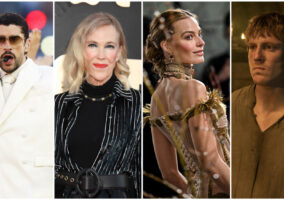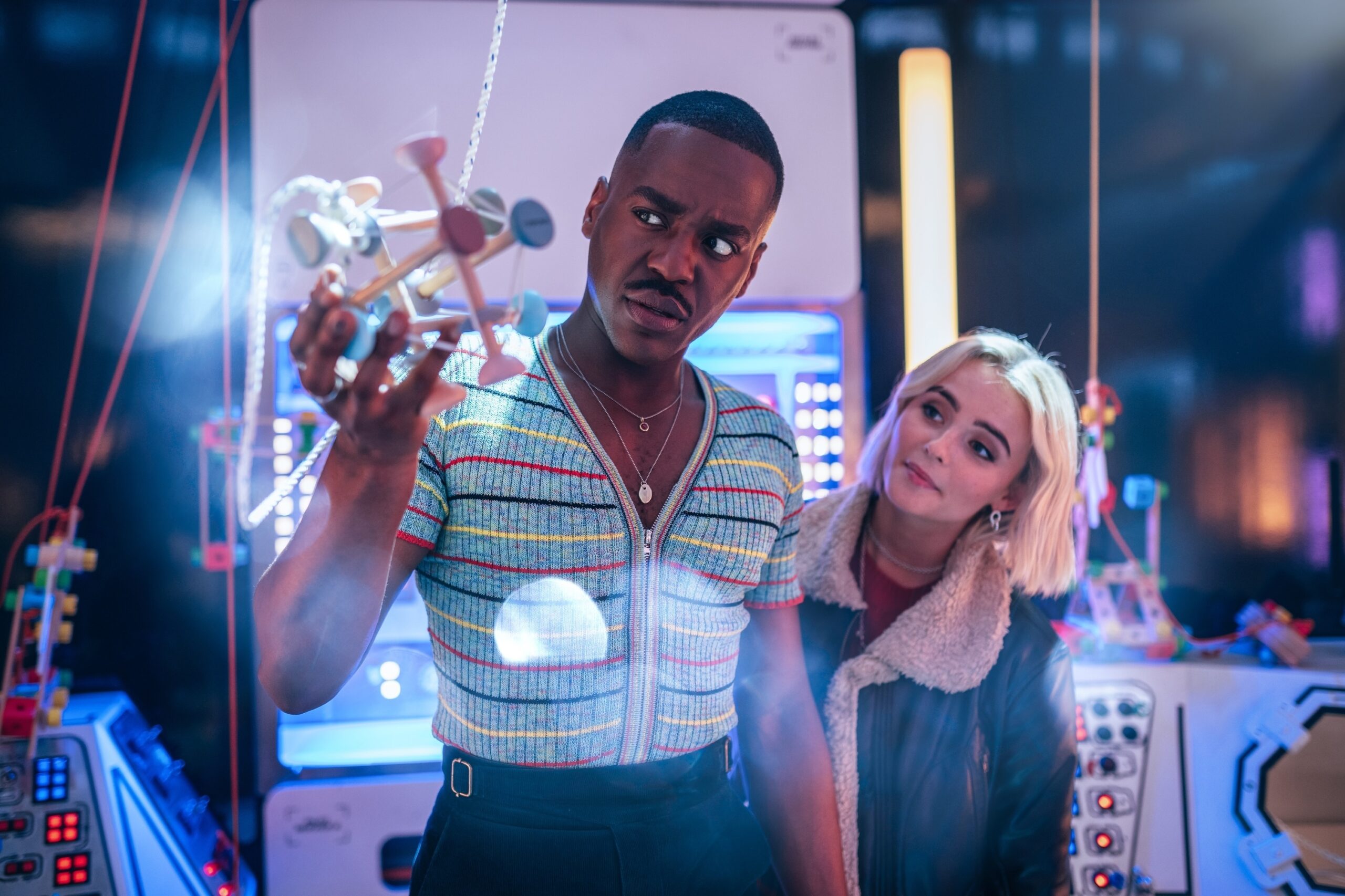
Two things became immediately clear in the opening moments of Doctor Who‘s new “first” season under the Disney banner: first, that those Disney Dollars were evident not only on screen, but in the newly whimsical tone; and second, that showrunner Russell T Davies is very much back on his Bad Wolf bullshit. And by that latter point we mean everything from the farting spaceship to the musical number to the talking babies to the sudden eruption of mysteries surrounding the latest Impossible Girl to enter the picture. It occurs to us that nearly everything preceding this sentence must sound like utter nerd glossolalia to any non-Who fan of long standing, so let’s backtrack for a second and get our bearings.
IN 2005, Russell T Davies was responsible for rebooting the Doctor Who franchise after it lay fallow for several years and shepherded it to new heights of international popularity, aided tremendously by a star turn from David Tennant and an iconic and definitive performance by Billie Piper that pretty much set the standard and created the mold for the modern Doctor Who Companion. In the years since, other showrunners took over and other actors and actresses stepped in to populate the TARDIS, but the franchise was showing signs of growing stale midway through Davies’ successor Steven Moffat’s run and by the time Jodie Whittaker made history as the first woman to portray the Doctor, showrunner Chris Chibnall couldn’t course-correct on close to a decade of stale progressions and repetitive story beats and the series limped along for a few more seasons. The show’s fandom was split (as fandoms tend to be) on Davies’ legacy, with many pointing to his farting aliens and other forms of campy silliness as being representative of a creative low point, but in the years since, as the show got drearier and drearier, his time as showrunner started seeming like a series high point, when the show was full of energy, whimsy, and one crazy idea after another.
Which is why, after the snot monster, the talking babies, the farting spaceship, the ancient drag queen god, and the musical number of these first two episodes (not to mention the goblins and the other musical number in December’s Christmas special), we can’t help but laugh. Russell T Davies came back and immediately displayed the exact same controversial tendencies that made the show a hit nearly two decades ago. And yet, it didn’t feel like a return to the past. In every way, this season feels very much like a reset and a path forward for the character. The point of splitting him off from the (second) David Tennant version in last year’s specials was so that all of the angst and heaviness that had weighed the character down for so long could be wished away, leaving the new Doctor to move forward without so much baggage. Interestingly, however, Davies does not seem in any rush to dispense with the character’s recent history. There’s a renewed focus on his status as the last of his race, but without the “lonely god” persona of the Tennant version. There’s also quite a bit of time spent on the recent revelation that the Doctor was a foundling and doesn’t know his own origins. The fandom was pretty negative on the idea that the character had a whole hidden history many times longer than the one they knew, which makes the renewed focus on it a surprising choice. So far, this take on the Doctor’s origins seems more thematic, tying him closer to Ruby, than a foreshadowing of any narrative direction, although it’s never a good idea trying to predict where Davies is going to go. As we said, he’s back on his Bad Wolf bullshit. If you don’t know the previous reference, suffice it to say, Davis is good at seeding nearly nonsensical hints throughout an entire season and paying them off rather well. We’ll throw few of them in at the end of the post to ponder.
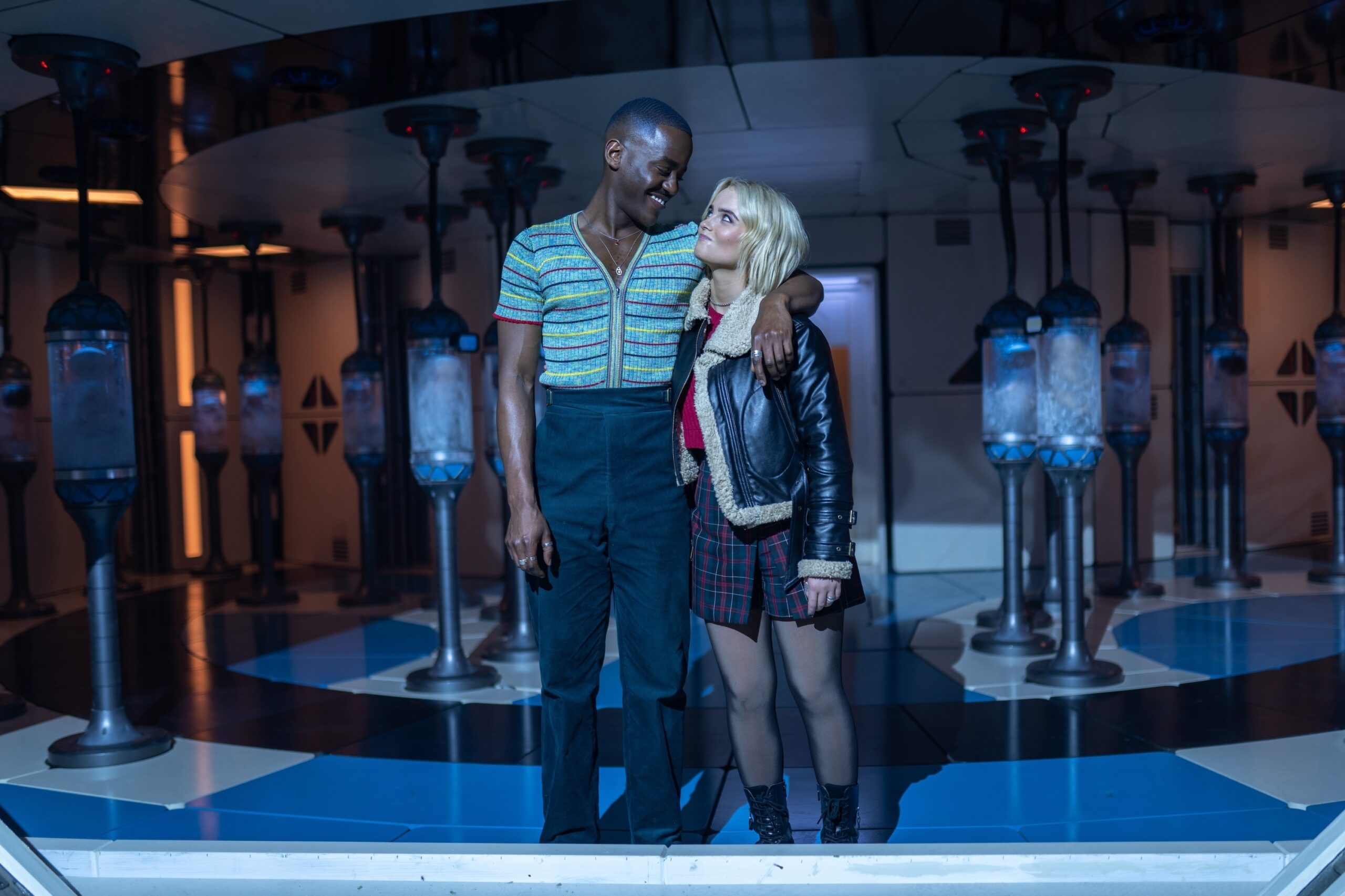
As far as Gatwa’s performance, he’s out-of-the-gate perfect; bombastic and flamboyant, outrageously confident and surprisingly tender. His performance, like all good iterations of The Doctor, is its own thing, but there is a lot of Tennant’s 10th Doctor in there, especially when he starts rattling off facts and observations while bouncing around from end of the set to the other. The energy level is extremely high with Gatwa’s Fifteenth, and the charisma (helped tremendously by his leading man looks) is off the chain. While we have no doubt that a segment of his detractors will find Fifteen’s queerness problematic, so far, we love how it tends to manifest in his occasional sassiness (the only Doctor who routinely addresses people as “Honey”), his clear love of fashion (and the tightness of his clothes), and most interestingly, his compassion. A lot of the “lonely god” trappings have been completely stripped away from the character, which means he’s free to tell babies they’re beautiful, he hugs more, and he makes sure his companion phones home no matter where they go. Milly Gibson as Ruby Sunday is the quintessential wide-eyed plucky English girl that tends to characterize so many of the Companions this century. As a character, she doesn’t come off all that original to us. If anything, she feels like a Rose/Amy/Clara mashup. As a performance, it struck us as a little rough and a little shallow. Granted, she’s being presented as one of those “living puzzle” Companions, which means she’s less of a character and more of a series of mysteries and quirks. Hopefully, Gibson will find her footing as her character develops.
When it came to the plots and direction of these two episodes, we admit we didn’t actually sit through them beaming with happiness the first time around. There’s an awful lot to love about the new direction and Davies’ sense of whimsy, but the old realization that many of his stories get a little nonsensical came roaring back to us as we watched these first two episodes unfold. In last year’s specials, Davies introduced the idea of magic into this franchise and immediately there were musical numbers and flying goblin ships magically disintegrating over London. The thing is, while Doctor Who is nominally a science fiction show, it never actually dealt with anything that could remotely be classified as science. Even Star Trek tries harder to make their technobabble sound legitimate. The Doctor waves his magic wa– sonic screwdriver to solve most problems and then jumps in his magic bo– Time And Relative Dimension In Space ship and flies away. It was ever thus. Calling it magic doesn’t change much about the type of stories its telling, but it does free up the show from having to work too hard to explain anything, which Davies tends to hate to do. And of course, it allows for the introduction of things like musical numbers. We’ll be honest, we’re not loving them. We get the impulse of wanting to see Ncuti tear up the screen, but they feel really weird in the context of the show.

To our way of thinking, it would be a mistake to attribute any of the parts we didn’t like to some sort of roughness that needs to be ironed out, as if Russell T Davies of all people would need to get his Doctor Who sea legs under him. No, he’s had plenty of time to prepare and more experience producing the franchise than almost anybody. For good or for ill, no kinks need to be worked out here. If anything, the show is demonstrating an extreme (and probably well-earned) confidence. Davies knows exactly what he’s doing here and if you don’t like it, we’re sorry to have to tell you that it’s not going to change or evolve. And going by these first few episodes, he is going to work political and topical references into it as much as he can; changing Donna Noble’s “binarybinarybinary” to a very pointed “non-binary,” making allusions to reproductive choice, the fate of refugees, and how capitalism eats and destroys creativity — all in his first three hours back in the driver’s seat. We genuinely don’t mind any of this. Sure, there’s a chance it could get clumsy or preachy if he overdoes it, but we were thrilled to see things like a discussion about pronouns and a reference to abortion with a Disney logo stamped on it. Which reminds us: Jinkx Monsoon was simply spectacular as the Maestro; so much so that we kept hoping for a reveal that she was the Master, just so we could see more of her. Granted, the Master is as overused as the Joker and Lex Luthor in terms of nemeses, but we’d have put up with yet another season-long arc if it meant more of Jinkx practically inhaling the scenery. That moment in the cold open when she broke the fourth wall and started playing the opening notes to the theme song gave us literal chills.
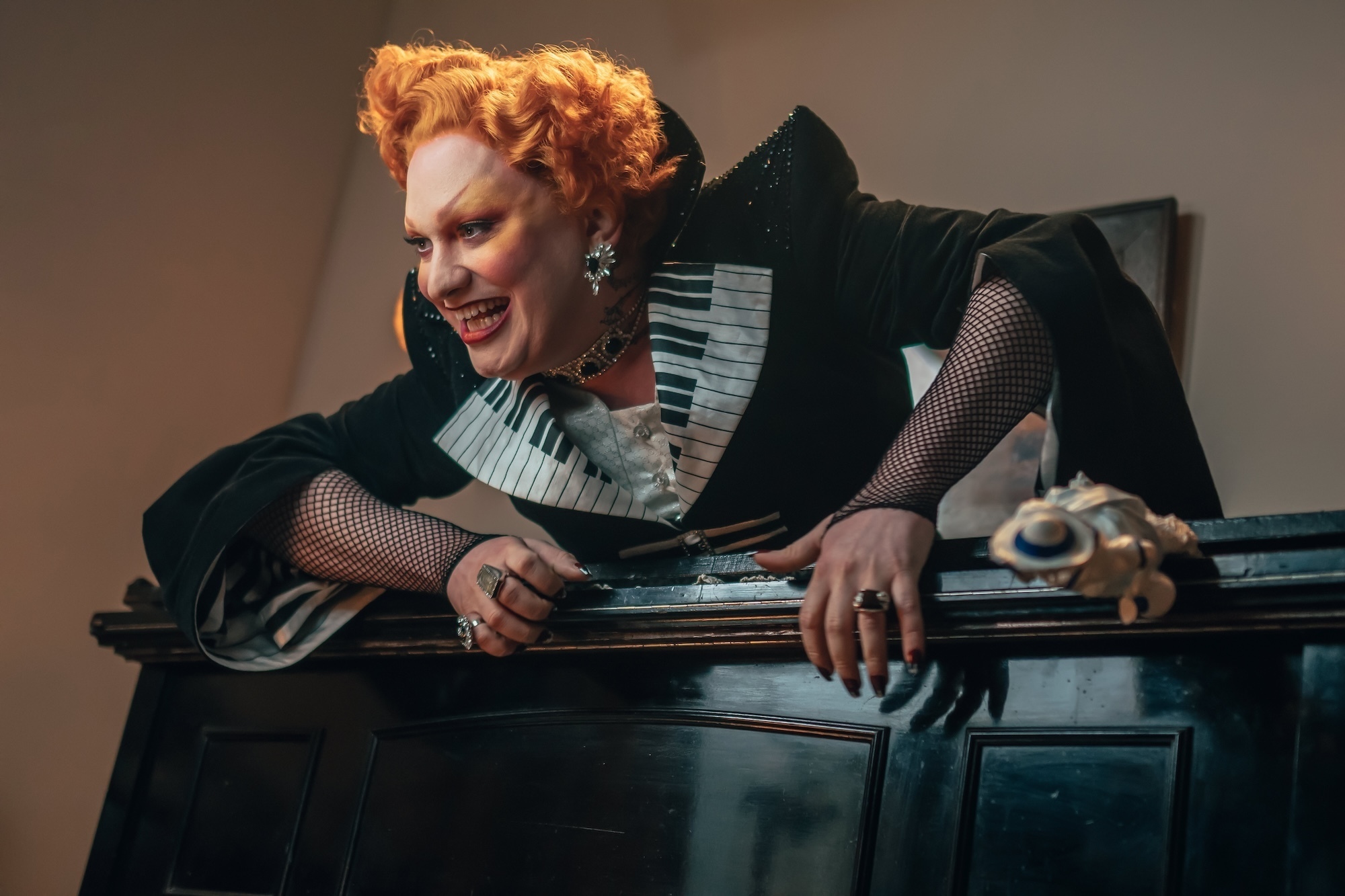
In sum: a good, fun time, a clear fresh start, but you’re going to have to let Davies succumb to his impulses if you want to enjoy it. We’re on board. Whatever quibbles we might have with the new tone matter less than the renewed sense of fun and energy radiating out of every scene. Doctor Who simply hasn’t been this fun in years. Now about those mysteries…
Obviously, Ruby’s parentage is the big one of the season. This would have been clear even without the magic snowfall and the Doctor’s suddenly altered memories of that night, just because a baby left on a church step is like the Chekhov’s gun of family drama. The Doctor’s surreptitious DNA scan (a nice callback to similar scenes with Amy and Clara) revealed her to be human, but the clues sure make it sound like whoever left her there wasn’t. We have no idea where this will go, but we suspect it will not rely entirely on new information. In other words, whoever Ruby is, she has some sort of tie to the lore. And speaking of the lore…
The Doctor mentioning his granddaughter Susan seems like a pretty big clue to us. Davies could have easily never brought this up, but given the focus on lost or abandoned children, it seems pretty clear that, despite the new tone, the series might be delving into one of its oldest mysteries. Note how the Doctor was unclear as to whether he did have a granddaughter or will have one, which puts a bit of a twist on the lore. And speaking of twists…
You had to know that the “There’s Always a Twist” musical number wasn’t just a bit of fluff, right? Davies is laying it all out for you. Expect twists. If he didn’t make it clear enough, check the acting credits for one “Susan Twist.” She’s the actress who played the old lady who charged half a crown for a cuppa tea in the EMI cafeteria. She’s also the old lady in the bar on Christmas eve when the power went out while Ruby’s band was playing, the old lady who chatted with Isaac Newton before Fourteen and Donna introduced the concept of mavity, and the old lady who recorded one of the crew messages on the baby space station. We won’t be conjecturing just yet, especially as the obvious answer – that she is, in fact, the Doctor’s granddaughter – seems just a little too obvious, no? There’s also Ruby’s neighbor Mrs. Flood, who knew what a TARDIS was, although we didn’t detect so much as a hint of a passing reference to her and we’re not sure if she has anything to do with Susan Twist, who is a real person, by the way.
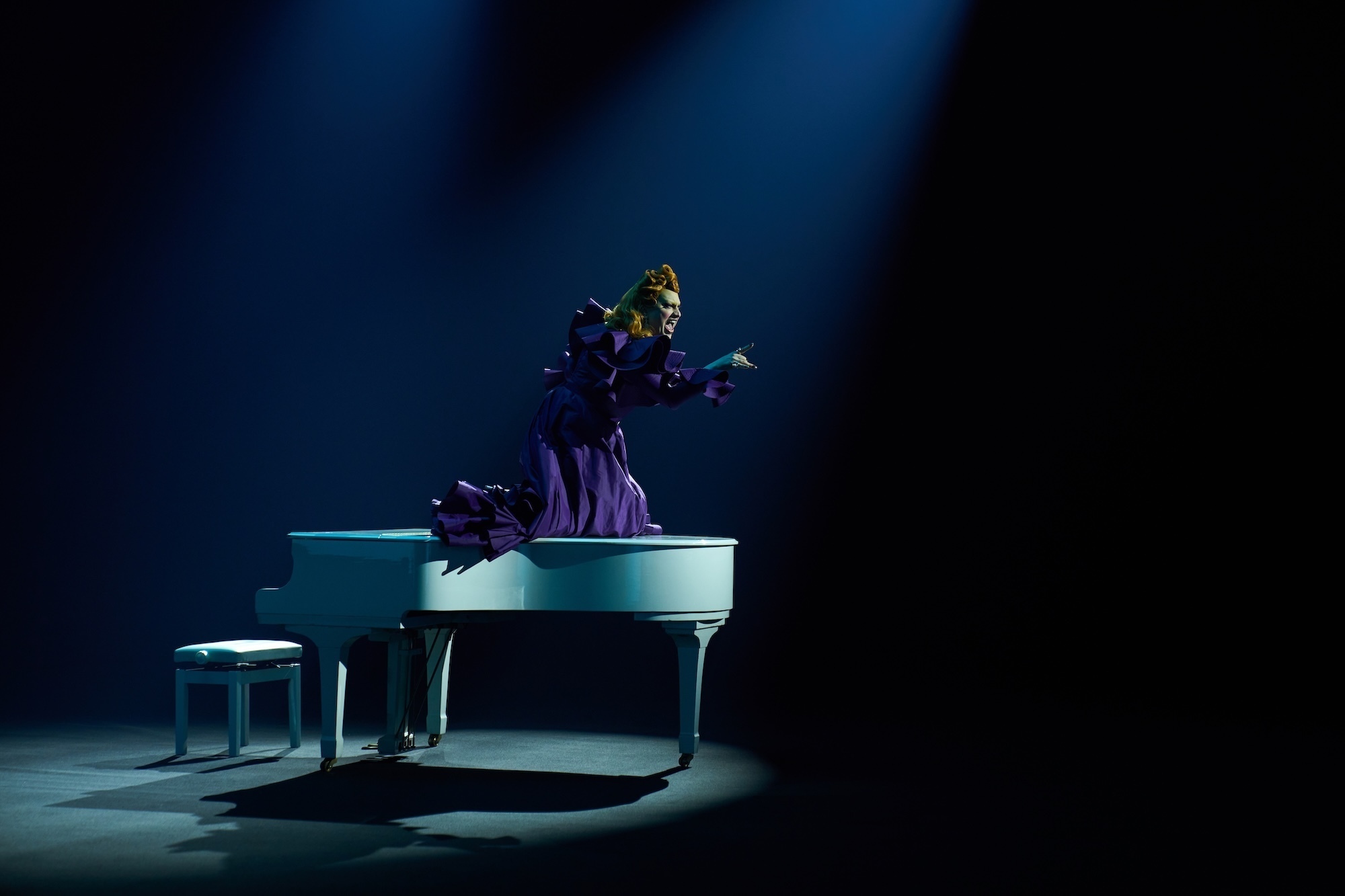
Two final, possibly meaningless (AS IF) things to note: The closed captioning noted that the Maestro was playing the “Saxon theme,” which most fans took as a reference to John Simm’s turn as the Master, when he became Prime Minister. Also, the camera lingered at a rather graphically odd white handprint on a brick wall. The reason we keep bringing up Bad Wolf is because that Davies plotline was seeded with similar little graphic reminders all through an entire season.
LOOT Star Maya Rudolph in Julia Heuer on THE TONIGHT SHOW STARRING JIMMY FALLON Next Post:
Style File: Meghan Markle in Nigeria
Please review our Community Guidelines before posting a comment. Thank you!

